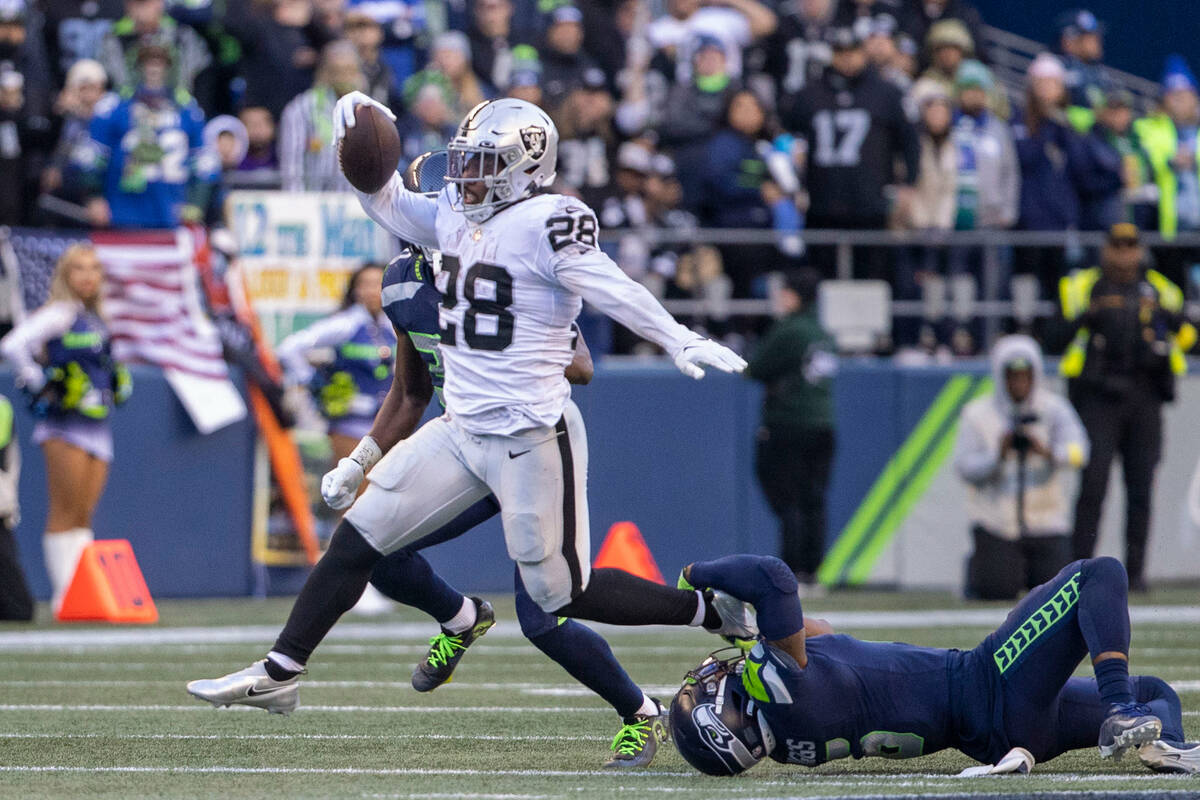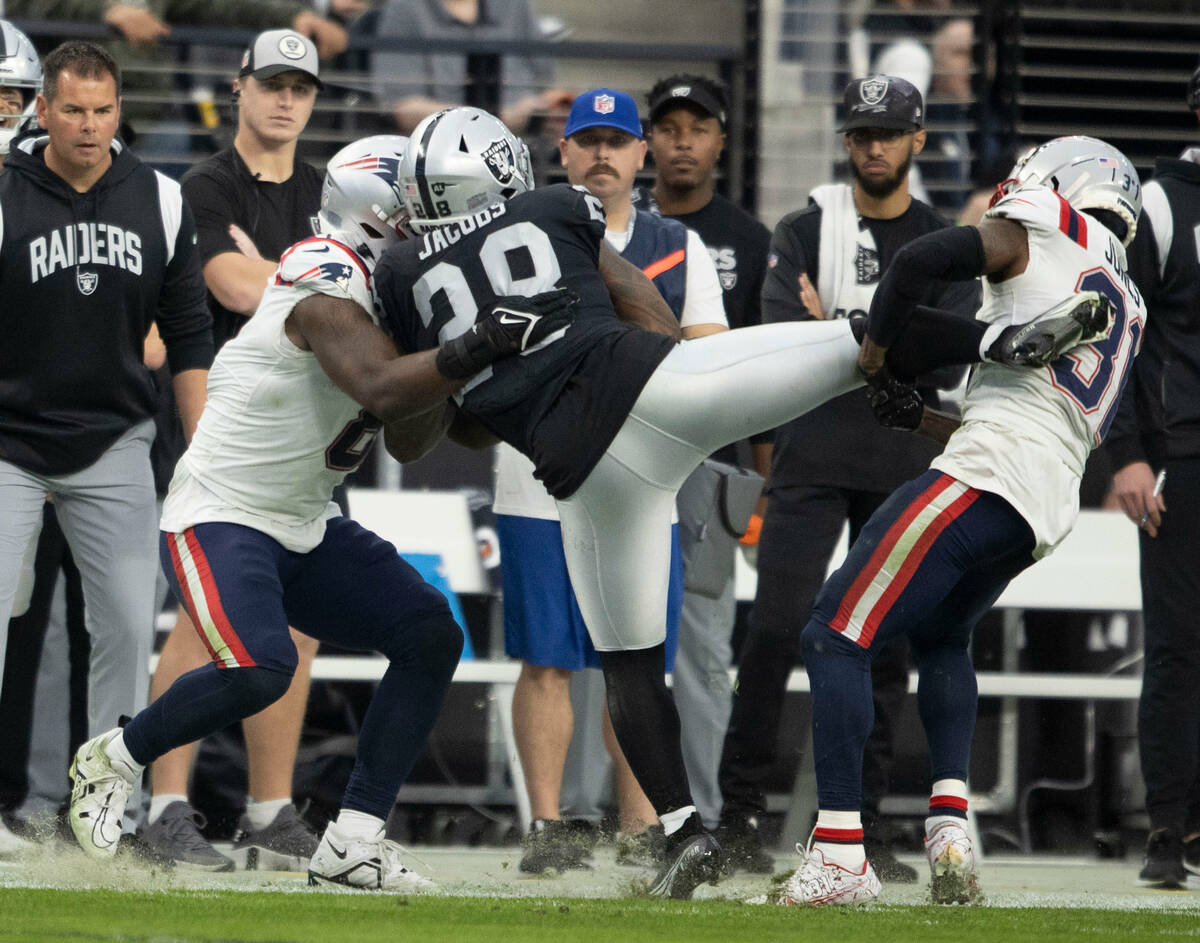Clock ticking as Raiders, Jacobs approach Monday deadline
The Raiders and running back Josh Jacobs are running out of time to come to terms on a multiyear contract agreement.
With Monday’s 1 p.m. PDT deadline looming to get a deal done — and if not, delay any new deal until after the 2023 season — it’s looking more and more likely that Jacobs will have to play this season under the terms of the franchise tag at a guaranteed $10.09 million.
Or, simply not play at all.
Jacobs has yet to sign the franchise tag tender and is already sending word that if the deadline passes without a deal, he will not report to training camp. It seems unlikely that any holdout would drag into the regular season, at which point Jacobs would be sacrificing actual paychecks while protesting a situation that, by rule, can’t be resolved until next year.
But that scenario can’t be ruled out, depending on how entrenched he is in his position, be it to take a stand on his own behalf or for present and future star running backs.
Deadlines sometimes spur actions, but the feeling is that the financial gap between the Raiders and Jacobs is too wide to close between now and Monday.
Here is a look at where things stand and all the various possibilities:
How did we get here?
Soon after coach Josh McDaniels and general manager Dave Ziegler were hired by the Raiders in January 2022, a decision was made to not pick up the 2023 fifth-year option of the rookie contract Jacobs signed upon being drafted in 2019. McDaniels and Ziegler were in evaluation mode, and not yet ready to commit to Jacobs beyond the 2022 season.
The decision ultimately benefited Jacobs, who delivered a sensational season in which he led the NFL with 1,653 rushing yards. Instead of being locked into the $7.901 million value of the fifth-year option, Jacobs was free to negotiate an even better deal or, as it presently stands, elevate his 2023 pay to the $10.09 million of the franchise tag.
In essence, Jacobs won. But he understandably wants more in terms of contract length and guaranteed money. He has not publicly disclosed how much money he is looking for, but he likely wants somewhere in the neighborhood of $26 million to $32 million in full guarantees, likely to be paid over the first two years of the new deal.
The problem is, at the very moment he is fighting for more, an NFL trend based on analytics and recent history is reducing the monetary value of running backs — specifically, how much teams are willing to pay them on second contracts and the roster-building prudence of doing so in a salary-cap system.
Ziegler and McDaniels, based on their past history with the Patriots, who rarely paid running backs top dollar, are proponents of that philosophy.
League trend
A quick look around the NFL paints a bleak picture for running backs, one that clearly takes the teeth out of Jacobs’ argument.
Just this year alone, the Vikings released star running back Dalvin Cook rather than pay him the $11 million he was owed in 2023 or absorb the $14 million he would have counted against their cap — even though Cook is 28 and coming off four Pro Bowl seasons.
In Philadephia, the Eagles barely blinked in letting Miles Sanders, who gained 1,269 yards on 4.9 yards per carry last year, walk as a free agent rather than pay him the $25 million ($13 million guaranteed) he got from the Panthers. Instead, the Eagles will pay Rashaad Penny, D’Andre Swift, Boston Scott and Kenneth Gainwell a combined $6.06 million.
Or less than the $6.9 million Sanders will make this season.
Meanwhile, the New York Giants’ Saquon Barkley and Dallas’ Tony Pollard are slated to play this season on the same franchise tag number as Jacobs, and Cincinnati’s Joe Mixon and Green Bay’s Aaron Jones took significant pay reductions to remain with their teams.
So while Jacobs is waging a noble fight, he is facing an uphill battle.
Training camp question
Jacobs has alluded to sitting out training camp if Monday’s deadline passes, and he probably should.
He hasn’t signed the tag, so technically he is not under contract. That means he is not subject to the mandatory fine players who are under contract are assessed when they hold out during camp.
Also, NFL players don’t get paid their salary until actual games are played, so Jacobs will not lose any money by not participating in training camp.
With his future to consider, it makes sense he will not step on the field and risk an injury until actual money comes into play.
As for the regular season, it’s hard to imagine Jacobs sacrificing actual paychecks — and money he will never recoup — by waging a protest that won’t yield any immediate results.
Trade possible?
Can the Raiders trade Jacobs? Yes. But it’s unlikely.
As a nonexclusive franchise tag player, Jacobs had the right during the offseason to negotiate a new contract with another team and present the offer to the Raiders to either match or pass on. Granted, under that scenario a team would have had to sacrifice two first-round picks to the Raiders as compensation if the Raiders didn’t match.
However, a side deal could have been made — much like the Raiders and Packers did in the Davante Adams trade — that could have lessened the compensation.
It’s notable nothing like that came to pass.
That doesn’t mean another team can’t still make a trade offer to the Raiders, but there are challenges to that as well. The trading team would simultaneously have to agree to terms with the Raiders while also coming to a contract agreement with Jacobs ahead of Monday’s deadline. Otherwise, Jacobs is in the same predicament he is now, while the new team will have parted ways with assets for a player who might only be around one season.
Also keep in mind that Cook, who has been every bit as good as Jacobs over his career, is available to be signed with no trade needed, as are a handful of other running backs. In such a bloated market, why make a trade?
Of course, that could change if a team suffers a major injury at that position during camp and turns to the Raiders, and Jacobs, for help.
Until the Raiders and Jacobs hammer out a new contract, it remains a fluid situation, There is still time to get a deal done, although things will take a different turn — and tone — if the deadline passes without one.
Contact Vincent Bonsignore at vbonsignore@reviewjournal.com. Follow @VinnyBonsignore on Twitter.
























